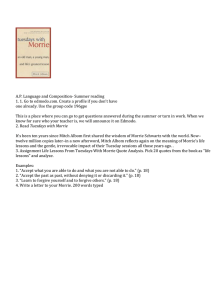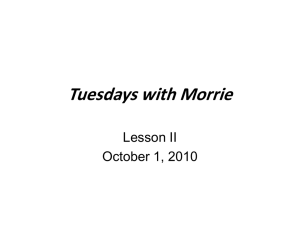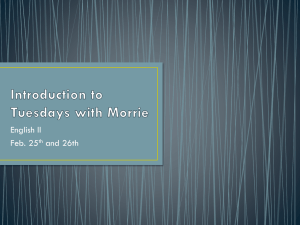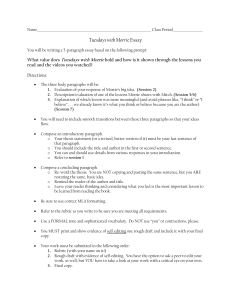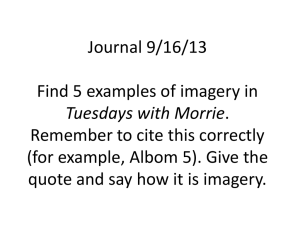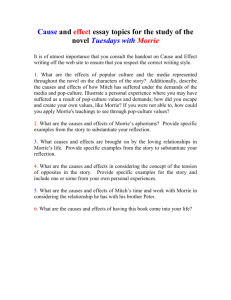Essay Assignment
advertisement
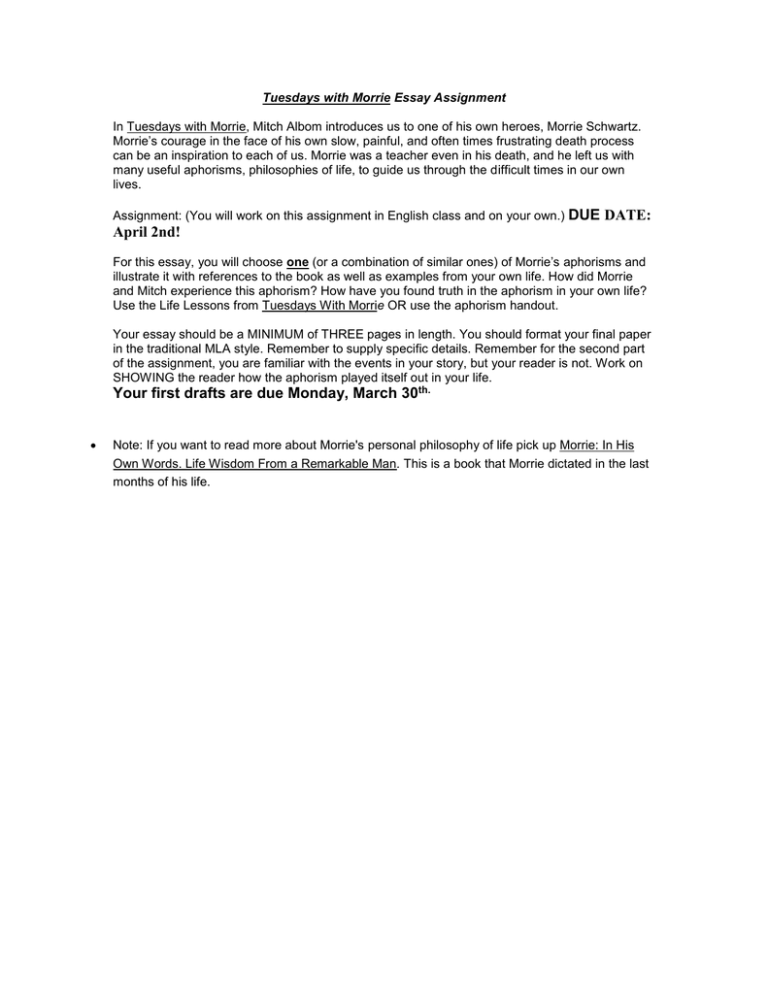
Tuesdays with Morrie Essay Assignment In Tuesdays with Morrie, Mitch Albom introduces us to one of his own heroes, Morrie Schwartz. Morrie’s courage in the face of his own slow, painful, and often times frustrating death process can be an inspiration to each of us. Morrie was a teacher even in his death, and he left us with many useful aphorisms, philosophies of life, to guide us through the difficult times in our own lives. Assignment: (You will work on this assignment in English class and on your own.) DUE DATE: April 2nd! For this essay, you will choose one (or a combination of similar ones) of Morrie’s aphorisms and illustrate it with references to the book as well as examples from your own life. How did Morrie and Mitch experience this aphorism? How have you found truth in the aphorism in your own life? Use the Life Lessons from Tuesdays With Morrie OR use the aphorism handout. Your essay should be a MINIMUM of THREE pages in length. You should format your final paper in the traditional MLA style. Remember to supply specific details. Remember for the second part of the assignment, you are familiar with the events in your story, but your reader is not. Work on SHOWING the reader how the aphorism played itself out in your life. Your first drafts are due Monday, March 30th. Note: If you want to read more about Morrie's personal philosophy of life pick up Morrie: In His Own Words. Life Wisdom From a Remarkable Man. This is a book that Morrie dictated in the last months of his life. Aphorisms from Tuesdays with Morrie Accept yourself, your physical condition, and your fate as they are at the present moment. Try to develop an inner emotional or spiritual peace to balance the distresses of your body. You might begin by learning to accept “what is” for you at any particular time. Expect that it’s going to be harder and take longer to do things. Be prepared to do things in ways that are very different from the ways you did them before. Get as much help as you can when you need it. Watch for emotional, spiritual, or behavioral regressions when you are most vulnerable. Try to avoid, minimize, or stop your regression. When you are utterly frustrated or angry, express these feelings. You don’t have to be nice all the time— just most of the time. After you have wept and grieved for you physical losses, cherish the functions and the life you have left. Expect to feel like a dependent child and an independent adult at different times. Accept the past as past, without denying it or discarding it. Reminisce about it, but don’t live in it. Learn from it, but don’t punish yourself about it or continually regret it. Don’t get stuck in it. Learn to forgive yourself and to forgive others. Ask for forgiveness from others. Forgiveness can soften the heart, drain the bitterness, and dissolve your guilt Be occupied with or focused on things and issues that are of interest, importance, and concern to you. Remain passionately involved in them. Resist the temptation to think of yourself as useless. It will only lead to depression. Find your own ways of being and feeling useful. Don’t assume that it’s too late to become involved or to redirect your interests. Take in a much joy as you can whenever and however you can. You may find it in unpredictable places and situations. Recognize the difference between what you want and need. Your need to feel connected to other people is as vital to human survival as food, water, and shelter. Be loving, compassionate, and gentle toward yourself. Befriend yourself. Do not put yourself down or criticize yourself continuously. If you are ill, you can experience more freedom to be who you really are and want to be because you now have nothing to lose. Be a witness to yourself. Act as an observer to your own physical, emotional, social, and spiritual states. If possible, find and develop a spiritual connection and practice that comforts you Find what is divine, holy, or sacred for you. Attend to it, worship it, in your own way Entertain the thought and feeling that the distance between life and death may not be as great as you think. Learn how to live, and you’ll know how to die; learn how to die, and you’ll know how to live. Life Lessons From Tuesdays With Morrie 1. “Accept what you are able to do and what you are not able to do.” (p. 18) 2. “Accept the past as past, without denying it or discarding it.” (p. 18) 3. “Learn to forgive yourself and to forgive others.” (p. 18) 4. “Don’t assume that it is too late to get involved.” (p. 18) 5. Find someone to share your heart, give to your community, be at peace with yourself, try to be as human as you can be. (p. 34) 6. “Love always wins.” (p. 40) 7. “The culture we have does not make people feel good about themselves. And you have to be strong enough to say if the culture doesn’t work, don’t buy it.” (p. 42) 8. “So many people walk around with a meaningless life. They seem half-asleep, even when they’re busy doing things they think are important. This is because they’re chasing the wrong things. The way you get meaning into your life is to devote yourself to loving others, devote yourself to your community around you, and devote yourself to creating something that gives you purpose and meaning.” (p. 43) 9. “ . . . if you really want it, then you’ll make your dream happen.” (p. 47) 10. “The most important thing in life is to learn how to give out love, and to let it come in.” (p. 52) 11. “Love is the only rational act.” (p. 52) 12. “I don’t allow myself any more self-pity than that. A little each morning, a few tears, and that’s all . . . . It’s horrible to watch my body slowly wilt away to nothing. But it’s also wonderful because of all the time I get to say goodbye.” (p. 57) 13. “Sometimes you can’t believe what you see; you have to believe what you feel.” (p. 61) 14. “What if today were my last day on earth?” (p. 64) 15. “Once you learn how to die, you learn how to live.” (p. 82) 16. If you accept you are going to die at any time, then you might not be as ambitious as you are. (p. 83) 17. There is no foundation, no secure ground, upon which people may stand today if it isn’t the family. (p. 91) 18. “Don’t cling to things, because everything is impermanent.” (p. 103) 19. “ . . . If you’ve found meaning in your life you don’t want to go back. You want to go forward. You want to see more, do more. You can’t wait until sixty-five.” (p. 118) 20. “Money is not a substitute for tenderness, and power is not a substitute for tenderness.” (p. 125) 21. “ . . . love is how you stay alive, even after you are gone.” (p. 133) 22. “Love each other or perish.” (p. 149) 23. “ . . . the big things—how we think, what we value—those you must choose yourself. You can’t let anyone--or any society—determine those for you.” (p. 155) 24. “Don’t let go too soon, but don’t hang on too long.” (p. 162) 25. “Be compassionate. And take responsibility for each other. If we only learned those lessons, this world would be so much better a place.” (p. 163) 26. “Forgive yourself before you die. Then forgive others.” (p. 164) 27. “As long as we can love each other, and remember the feeling of love we had, we can die without ever really going away. All the love you created is still there. All the memories are still there. You live on—in the hearts of everyone you have touched and nurtured while you were here.” (p. 174) 28. “Death ends a life, not a relationship.” (p. 174) 29. The important questions have to do with love, responsibility, spirituality, awareness. (p. 175) 30. “You’re not a wave, you are part of the ocean.” (p. 180) 31. “ . . . there is no such thing as ‘too late’ in life.” (p. 190)
